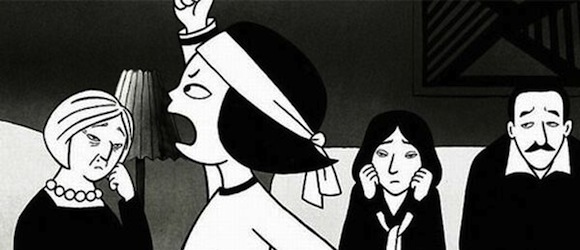Public School Librarians in Chicago Ordered to Remove Marjane Satrapi’s Persepolis from Shelves
BAD IDEAS FROM SMART PEOPLE

Marjane Satrapi‘s Persepolis, if you haven’t read it (and I highly recommend you do, perhaps after borrowing it from your local library) is a memoir of growing up in a secular and feminist family during the first decade of the Islamic Revolution in Iran, a family that eventually decided that in order to keep their daughter safe without going against everything they’d already taught her about confidence and morality was to get her out of the country. Its two part narrative touches on religion, self-confidence and self-discovery, morality, femininity, justice, and protest, among many other issues.
So I can understand why many librarians in Chicago were puzzled by a direct order to remove the book, which is actually part of the curriculum in some classrooms, from libraries, classrooms, and even the hands of student borrowers.
Wednesday, library officials were sent the following email:
Yesterday afternoon, one of the Network Instructional Support Leaders stopped by my office and informed me (per a directive given during the Chief of Schools meeting on March 11) that all ISLs were directed to physically go to each school in the Network by Friday (3/15) to:
*Confirm that Persepolis is not in the library,
*Confirm that it has not been checked out by a student or teacher,
*Confirm with the school principal that it is not being used in any classrooms,
*And to collect the autobiographical graphic novel by Marjane Satrapi from all classrooms and the Library.I was not provided a reason for the collection of Persepolis. If I learn more I will inform all staff.
Persepolis has run into trouble before with bans. An airing of its Oscar nominated animated adaptation sparked protests in Tunisia, over the fact that it visually depicts Marjane’s childhood conversations with god (and also Karl Marx, whose depiction is less controversial under fundamentalist Islamic law). However, according the the graphic novel’s American publisher, it has never been banned before in America.
Some Chicago teachers seem to believe that the books are being collected due to a mis-delivery of books that were not actually purchased by the school system, while others have countered with by pointing out that all of the library system’s copies were purchased by one school teacher after applying for a grant for just such a purpose. Either way, no official rationale for removing the books has been offered so far. At least one teacher has reported a sense of suppression of dissent coming down on those asking for a good reason behind the email.
While I can’t say that I find the reasons behind banned books to ever be understandable, per se, I can still probably take a stab at guessing why Persepolis might come to be banned. The fact is, many books wind up on the ALA’s banned book list every year, usually for depictions of sex, racial tension or racial minority perspectives, poverty, and the effects of all of those things on children and teenagers around the age of puberty. Persepolis depicts a lot of drug use (as unhealthy) in its second half, as well as a bit of (non-explicit) sex, as well as torture (Marjane has an uncle who spent years as a political prisoner) and death. And, of course, the entire book is written from a perspective we very rarely see in American culture. It could be any or all of these things that put the book one someone’s radar. Fortunately, it seems that teachers, parents, and students are already rallying to keep the book on library shelves.
Update (via Ladies Making Comics): The Chicago Tribune has some coverage of the story, including the reason it is considered to be problematic (a one page depiction of torture), and a statement from Satrapi herself:
“These are not photos of torture. It’s a drawing and it’s one frame. I don’t think American kids of seventh grade have not seen any signs of violence. Seventh graders have brains and they see all kinds of things on cinema and the Internet. It’s a black and white drawing and I’m not showing something extremely horrible. That’s a false argument. They have to give a better explanation.”
Satrapi said her goal in writing the book was to make average Iranians seem more human for the rest of the world, rather than be seen as “the axis of evil.”
She said she has heard from 11- and 12-year-olds who have read her book.
“They’ve told me, ‘You’re a human being just like us.’ My goal was to make peace.”
Chicago Public Schools Chief has directed teachers to disregard the earlier message about pulling the book from all classrooms and libraries and amended the order to simply removing it from the 7th grade curriculum.
(via The Beat and Comic Book Resources)
Are you following The Mary Sue on Twitter, Facebook, Tumblr, Pinterest, & Google +?
Have a tip we should know? tips@themarysue.com